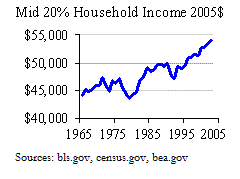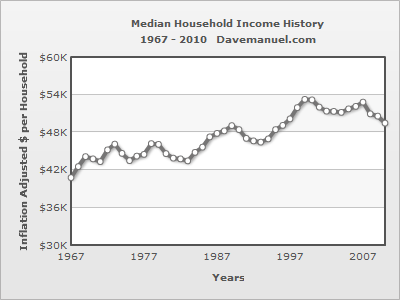Deregulation is being sold by Republicans as a job creator. I see no evidence of that. Firms dont expand or contract on the basis of environmental or workplace safety rules. They do so because theres demand for their products. In my opinion, deregulation in the financial industry was a primary cause of the recession which was most damaging to middle class workers.IMHO, there are three major reason for decline of the working class, deregulation, decline of the unions, and the wholesale exportation of American jobs.
The deregulation that began with Reagan and continued for nearly 30 years made large corporations answerable to no one but their stockholders. Legislation that allowed financial corporations to chose their own regulator was tantamount to setting regulations aside. The demise of Glass Steagall allowed bankers to become speculators. The result was the recession of 2008 which has taken it's biggest toll on the working class.
In 1980, one every 5 workers were union members. Today the figure is closer to 1 in 10. Weaker unions have resulted in improved productivity and higher profits at the expense of blue collar workers. The decline in union membership parallels the decline of American workers.
The demise of unions with the exportation of manufacturing jobs have created a social problem that will haunt us for many years. Free trade never made any sense to American workers. Politicians and big business sold it to the public. It did exactly what it was planned to do, trade good paying American jobs for low cost foreign labor. If that's not bad enough, we created loopholes in tax laws that encourages businesses to send jobs overseas.
Not sure I see the connection between deregulation and the decline of the working class. Maybe you or some one else can elaborate.
I think the decline of the unions is partly their own fault. Union leadership got too involved in politics instead of partnering with management, and they went too far in demanding medical and retirement benefits. Not to say management wasn't fully at fault too, but unions took a very adversarial position that cost them jobs.
Free trade is a different story, if you enact protectionist measures then you ultimately hurt your economy and your citizenry. If you want an example, read what happened to Argentina under Juan Peron.
All of these issues probably deserves it's own thread.
I'm not in favor bringing back the tariffs of 50 years ago, but I'm not in favor of a totally free trade policy. Many of our trading partners certainly protect their industries and we should respond in kind. It makes no sense to have free trade with countries that provide massive government support to their industries, restrictions on American expansion, and large scale product dumping to ward off competition.
Free trade in theory is great. Each country is able to do what it can do best and the standard of living goes up worldwide. In theory industries that cannot compete disappear and it's workers migrate to other more competitive industries. For a multitude of reasons this doesn't happen.
A word about deregulation - The NFIB (National Federation of Independent Business) does a survey of small business owners. In the latest one for July 2011, small business owners cite poor sales at 23%, taxes at 20%, and gov't regulations and red tape at 16% for their biggest problem. It is not going to be the sole reason or even biggest reason why businesses are not hiring, but it's not inconsequential either. There are estimates that small businesses have to spend approx $10k per employee to comply with all the rules, old and new, $8k for their larger brethen companies.
So, poor sales (lack of demand) is obviously a factor, but it's not that simple to just assume that our troubles are over if demand picks up. Why? Because it's gotta be sustained, it's great if we fix a road or a bridge but 6 months later the guys are out of work again and we've added another trillion or so to the debt/deficit. It should be obvious by now that stimulus packages are not the answer, however large they are. Sure, you get an uptick, but you don't solve the problem.
Small Business Economic Trends Survey - NFIB Optimism Index





